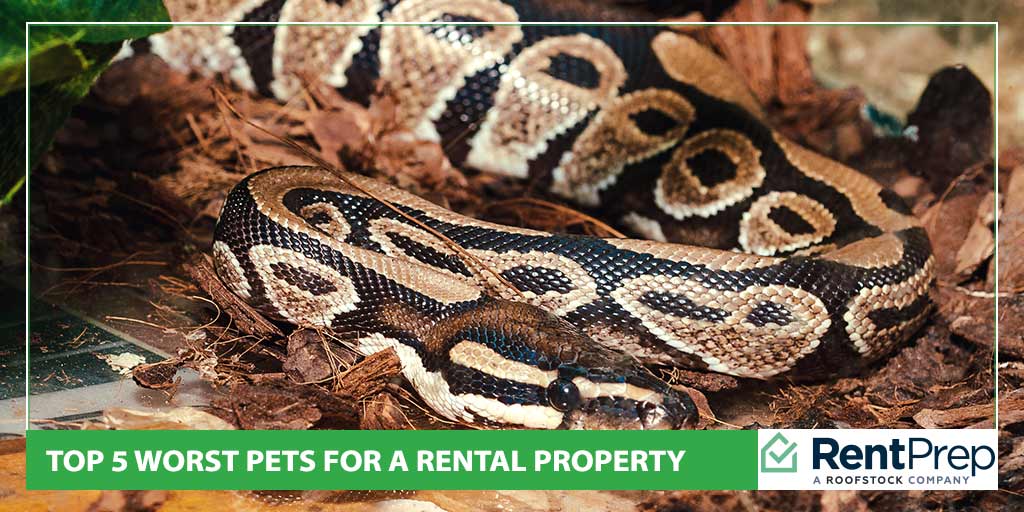
Whether you’re a landlord or a renter, pets are always a huge sticking point when it comes to renting out a property.
Some landlords allow cats and birds but no dogs, while others are open to pretty much everything.
If you find yourself in a situation with a renter having a destructive pet, it’s important you get a Pet Policy in place.
My rental is in the middle of an urban area so there aren’t a ton of people with pets so it’s never really been an issue for me.
But now that I’m a renter again, I get to see the other side of what it’s like to live with all these pets. My apartment complex has a pretty flexible pet policy and I’ve seen everything from cats and dogs to parakeets roaming around the complex. Some animals are louder than others and some are more of a nuisance than you would think. So what’s the worst type of pet?
This is my personal list of worst pets from a landlord, owner and renter’s point of view all wrapped into one.
#5: Reptiles

Growing up, we actually owned a snake and it was relatively easy to take care of. It made the room stink a little bit but once a week we’d drop a mouse in the cage and that would be that. I think the only apprehension I have with reptiles is some of them are pretty dangerous and if they somehow get out of their cages you could have a big problem on your hands.
#4: Fish
I think most landlords would probably be OK renting to someone with a fish tank. You might have to put a size limit on it though since if the tank broke you don’t want to have a massive flooding on your hands. The nice thing about fish is that they keep to themselves and they don’t make any noise like some other pets do.
#3: Dog damage to rental property
As a renter, I would love to have a dog. It’s nice coming home to see that happy face every day no matter what mood you’re in. That’s probably why so many people live with dogs, they make for great companionship. And while most dogs are well behaved and quiet, the 10% who aren’t can really ruin it for everyone.
Having lived in several different residences (houses, condos, apartments) over the past 10 years I’ve seen all sizes and manners of dogs and the only thing that really bothered me were the tiny dogs with high pitched barks.
#2: Cats

Let me preface this by saying I am not a cat person. Even though they can be trained to use the bathroom in a small sandbox, I have never been a fan. But that being said, many people do love their cats and the thought of living without them is torturous.
Cats are pretty quiet by pet standards so the number one issue that comes up with them is damage. Felines tend to gnaw on things around the house, scratch walls and basically do all the little things to damage your property. You could offset this by requiring a larger security deposit but cats definitely add a lot of wear and tear to your property.
#1: Birds
You might not think that birds would top the list of worst pets but I’ve never met a quiet bird. They are constantly squawking and screeching and they are at their worst when the owners are not home. So bird lovers might think their pets are well behaved when they’re around but the second they leave, these animals tend to make the most noise.
I think the bird-loving population is pretty small so you wouldn’t be losing many potential tenants by disallowing birds but you would be keeping it nice and quiet for everyone else.
FAQs on Pets and Rental Properties
Does no pets include caged animals?
Typically a no pets clause does include caged animals. This will be at the discretion of each landlord but in most cases, a landlord will have a zero pets policy across the board regardless of if the pet lives in a cage or not.
Are birds considered pets when renting?
Yes, most landlords will consider a bird a pet and charge a pet deposit if the bird is allowed. Birds can cause considerable damage if let out of the cage so the landlord will want to limit any damages and cover themselves with a pet deposit.
Do you have to pay a pet deposit for caged animals?
Unless the pet is considered an emotional support animal or a service animal you will most likely have to pay a pet deposit for a caged animal. The pet deposit is at the landlords discretion but most will charge a deposit and sometimes a monthly fee for your animal.

